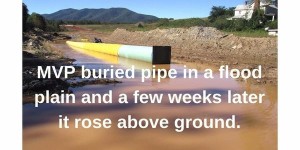
42 inch Mountain Valley Pipeline is larger than previous pipelines, probably too large for the steep terrain and many stream crossings
From an Article by Laurence Hammack, Roanoke Times, April 24, 2020
The Mountain Valley Pipeline is still targeting a completion date of late this year, a spokeswoman said Friday, despite reports of the suspension of a nationwide program needed to grant a key permit it lacks.
Last week, a federal judge in Montana vacated a permit for the Keystone XL pipeline to cross streams and wetlands in a decision that also applied to other projects, including the controversial natural gas pipeline being built through Southwest Virginia.
The Associated Press reported Thursday that the U.S. Army Corps of Engineers — which approves the permits on a general basis for pipelines, utility lines and other construction work that must cross a water body — has suspended the process in light of the court ruling.
Mountain Valley spokeswoman Natalie Cox said the company was aware of comments from the Corps about its so-called Nationwide Permit 12, which the AP attributed in part to emails it had obtained.
“We are awaiting further developments on the Montana federal court case … to understand any potential impacts on the MVP project,” Cox wrote in an email, adding that the company still was aiming to complete work on the 303-mile pipeline by the end of the year.
Mountain Valley was originally slated to be done by late 2018, and delays caused by legal challenges from environmental groups have in large part caused its estimated price to soar from $3.7 billion to as much as $5.5 billion.
“Continued delays will further erode the case for completing the MVP,” said Thomas Hadwin, a retired gas and electric utility executive from Waynesboro who is opposed to the project.
While Mountain Valley officials have said the pipeline is 90% done, “this is probably one of the biggest outstanding issues for them,” he said.
Hadwin said it was difficult to say whether the joint venture of five energy companies would abandon the project at this late stage, as opponents hope.
“The more money they put in, the harder it is to say, I’m going to give up,” he said. “I think that most board members would say, we’re so far in, let’s keep going.”
Larry Liebesman, a senior adviser for the water resources consulting firm Dawson & Associates in Washington, D.C., said he was not surprised to learn of the Corp’s suspension of its permitting process for stream and wetland crossings.
“My read of it is they felt it was important to abide by the court order, which in effect was a nationwide injunction against use of the Nationwide Permit,” he said.
It was not clear Friday how long the suspension might last. A spokesman for the Army Corps referred questions to a counterpart at the U.S. Justice Department, who had not responded by 6 p.m. Friday.
Environmentalists have long decried the Nationwide Permit process, which takes a blanket approach for projects the Corps determines will not cause significant harm to natural resources. An individual analysis of each stream crossing is needed to fully evaluate a pipeline’s effects, they say.
“Permit applications for projects like MVP would — and should — fail if project-wide impacts were more thoroughly examined,” said Russell Chisholm, co-chair of the anti-pipeline group Protect Our Water, Heritage, Rights.
Over the past two years, Mountain Valley has been cited repeatedly by regulators in Virginia and West Virginia for noncompliance with required measures to control erosion and sedimentation. Muddy runoff from construction sites along steep mountain slopes has carried sediment into nearby streams.
Mountain Valley has blamed much of the problem on heavy rainfall in 2018, and says it is working to have three sets of suspended permits — including the one to cross more than 1,000 streams and wetlands — restored in time to resume work by the late spring or summer.
An original water-crossing permit granted to Mountain Valley more than two years ago was set aside by the 4th U.S. Circuit Court of Appeals. The company had applied for a new approval and was waiting on a decision when the recent court decision came down.
Because the Nationwide Permit is also used by power lines and other utility work, critics say the ruling by U.S. District Court Judge Brian Morris goes too far.
The Justice Department is likely to ask the judge to narrow the scope of his ruling, and to then appeal if he does not, according to Height Capital Markets, an investment banking firm that has followed Mountain Valley. “The universe of the kind of projects that would be affected is incredibly broad,” Liebesman said.
#############################
See also: Dominion Energy: Significant new natural gas generation not viable, NBC News 29, April 8, 2020
RICHMOND, Va. (AP) — Dominion Energy Virginia recently told state regulators “significant build-out” of natural gas-fired power plants is no longer viable because of renewable energy legislation lawmakers passed earlier this year.
The disclosure came in a filing with the State Corporation Commission several weeks before Dominion has to file its integrated resource plan, or IRP, a long-range planning document that describes how the utility will generate power to comply with regulations and meet customer needs.
The company’s critics called it the latest development to raise questions about why the Atlantic Coast Pipeline, the approximately $8 billion multistate natural gas pipeline the utility’s parent company is spearheading, is needed.
When Dominion proposed the pipeline in 2014, it was planning to build several thousand megawatts of additional natural gas generation in Virginia, said Will Cleveland, an attorney with the Southern Environmental Law Center.
